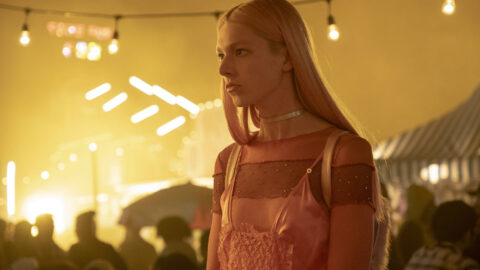
A campaign has been launched to save the London pub The Ravensbourne Arms and convert it into a community-owned live music venue for all ages – marking one of many attempts to put gig spaces in the hands of music fans rather than private landlords.
The Lewisham pub has been boarded up for four years, but now the collective Sister Midnight have launched a bid to raise £500,000 – offering fans in the community the opportunity to hold a stake in what would be a not-for-profit grassroots live music pub.
So far, the campaign has received support from the likes of Fontaines D.C., Porridge Radio, Goat Girl, London Night Czar and DJ Amy Lame and Jools Holland among many others, hoping to see the building transformed into a “safe, inclusive, all-day space that puts the local community – the entire community, in all its glorious forms – at the heart of everything they do”.
Having previously run a venue in Deptford, Sister Midnight explained how the pandemic-enforced closure of venues proved a “catalyst for realising that we needed to create a new space that was going to be sustainable in the long-term” without the pressure of having to pay private rents.
“Our mission is to create a space for live music that can be accessible, affordable and inclusive – and a space that can be more sustainable against the threats that can be posed to venues,” Sister Midnight’s Lenny Watson told NME. “The pandemic was a big one. People might argue that it’s not the best time to be doing it, but I’d argue that there’s really not a better time to be securing the future of our grassroots music venues against these kinds of threats.”
Watson explained how one of the biggest threats to grassroots venues, even long before the pandemic, was private ownership.
“The fact that [venues] don’t own their buildings doesn’t give them the level of control that they need over them,” she said. “We’re keen to have a venue that’s not owned by us, but by the community. This will ensure that the future of the venue is safe and in the hands of the community for them to use and benefit from.”
Under the scheme, anyone who is a member of a community benefits society will collectively own the venue and its assets alongside other members – as well as getting a say in what goes on at the space.
On their other plans for the venue, Watson revealed: “Obviously live music will be at the core of what we do at the Ravensbourne Arms, but there’s so much scope to use the space for loads of other things that will benefit the community.
“We want to have an affordable rehearsal space and recording studio in the basement of the pub, we want to run parent and baby music classes, we want to run under-18 nights because the provision for that is so sorely lacking in the local area. We want to do skills-training workshops and drop-in events where people can learn new skills and crafts. We just want it to be a real hub of creativity and community life where people can really come together and use the space for all that it can provide.”
With many bands from the south London scene and far beyond showing their support and playing fundraising gigs, Watson said that, combined with the support of the music-loving community, they were confident of reaching their half-a-million pound target.
The collective launched a community consultation back in January which ran for 10 days as a short survey on social media, while they also managed to secure £90,000 for a provisional budget. Now, they have a comprehensive business model and plans for the future – preventing the pub from being knocked down like so many before it.
“If we aren’t successful in raising this money and saving the Ravensbourne Arms, I think there is a real chance that eventually the council are going to cave and just grant planning permission for it to be converted into flats,” Watson added.
“So far the council have refused that planned consent because they recognise the community importance of the pub, but I think there is a real time pressure to this. We need to ensure that pubs like the Ravensbourne Arms, which are real community assets, are protected. The best way to do that is to bring them into the ownership of the community that loves them.”
As mentioned at the Music Venue Trust’s recent NME-partnered Venues Day event in London earlier this month (October 5), next year will see an increase in efforts for gig spaces across the board to be brought into the ownership of trusts, communities and music fans rather than private landlords.
“We have to take ownership of our grassroots music venues, it really is as simple as that,” Music Venue Trust CEO Mark Davyd told NME. “We can’t keep fighting endless battles with landlords, developers, local authorities, neighbours from a defensive position which is incredibly weak.”
Davyd went on to explain how “93 per cent of all the grassroots music venues in the UK are tenants, and the average amount of time left on their tenancy is 19 months”.
“If we want to win the war of music venues, we need to Own Our Venues,” he added. “Sister Midnight’s project to take over the Ravensbourne Arms is the ground zero of that war. It’s a community ownership model that means the venue isn’t just secure for the next year, or two years, it’s sustainable for decades.
“We want to build a world-class touring circuit for new and breaking artists to find a home and an audience in. Own Our Venues is the campaign that enables us to do that.”
Visit here for more information on how to save The Ravensbourne Arms.
MVT’s Venues Day also saw Bob Vylan frontman Bobby Vylan call for more diversity both on and off-stage in live music – as well as more local support bands and regional shows.
“I hope we start to see more diversity in these venues: from the artists that are booked to the venue staff and operators,” he told the audience at EartH in Hackney. “The lack of Black-owned venues is a problem that I won’t attempt to dissect right now, but more accessibility to ownership needs to be encouraged, as does the diversity of all the staff and crew.
“Of all the venues we have played at, I have only ever seen one venue with a sound engineer who wasn’t a man. Furthermore, I have never seen any people of colour performing this role in any of the venues that we have performed in.”
He added: “This is a problem. How can it be that I know female engineers, Black and brown engineers, but can’t manage to find any in the venues? Just like every other sector, there is work to be done.”
The post Campaign to save London pub marks wave of future community-owned music venues appeared first on NME.





